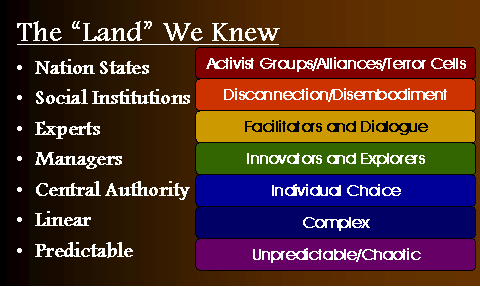
Part 1 Naming the Change
Theres a lot of uncertainty and anxiety in our culture and it makes us feel like we are living in a foreign land. How do you follow God in a land that is changing? For some people the challenge is that they have left the land they knew. But what if the land you knew has left you? Where did it go? Whatever happened to home?
Thats the sort of feeling expressed in this popular song (Mayberry by Rascal Flatts)...
Sometimes it feels like this world is spinning faster
Than it did in the old days
So naturally we have more natural disasters
From the strain of a fast pace
Sunday was the day of rest
Now its one more day for progress
But we can't slow down
Cause more is best
All in the processBut I miss Mayberry
Sittin on the porch drinking ice cold Cherry --- Coke
Where everything was black & white
Pickin on a Six String
People pass by and you call them by their first name
Watching the clouds roll by
bye bye
Sometimes I can hear this whole world stopping
Through the trees as the wind blows
Thats when I climb up here on this mountain
And look through God's window
No I can't fly
I've got to be
To get me high up here
Far from the noise and city streets
My world receives the peacechorus
Sometimes I dream I'm driving down an old dark road
Not even listed on the map
I pass a dad and his son carrying a fishing poll
But I always wake up everytime I try to turn back
Heres how I want to frame this discussion:
1. Naming the Change
First, lets name the change. If you know what you are up against that helps. The changes we are feeling all around us are both good and bad they are a mixed bag. They present challenges and opportunities. The goal will not be to strategize but to simply attach some name to whats going on.
2. Nomads and Exiles
Second, lets learn some lessons from nomads and exiles. The Bible tells the story of Gods faithfulness with people who are always being uprooted, scattered and dispersed (Beginning with Abraham and continuing through to the persecution in Acts 8; and the churches in Asia were also unsettled) We even sing songs that say things like "This world is not my home, I am just passing through." Do we mean it?
3. Plans for the Future
Third, well talk about plans for the future. But they arent my plans or your plans. They are the plans for the future that are a gift from God.
Naming the Change
(I am indebted to Alan Roxburgh for indicating many of the details of this section. I recommend his book: The Missionary Congregation, Leadership, and Liminality, Christian Mission and Modern Culture Series, Trinity Press International, 1997)

The "Land" We Knew was predictable and stable. Of course by land we do not mean a physical location. We really mean a culture situated in a particular time and place. For most of still alive that would be the America we knew during the 1950s-1980s.
We can recall some of the "landmarks" of that land ...
Consider how these factors have contributed to the change we are trying to name:
During the opening theme song of All in the Family, Archie and Edith sang nostalgically of the past: "Those were the days" One line in the song hits home for everyone: "And you knew who you were then." The massive changes lead to an identity crisis.
Consider how the changes described above lead to these effects ...
Conclusion:
We are experiencing a barrage of changes (not just one change)
Personal Choice is god (pick and choose)
No central Authority
New insecurity (state of fear)
Hope for the Future in Deuteronomy 4:29-30
Deuteronomy means the second giving of the law. It anticipates the day when the people of God will be refugees and exiles in a foreign land. It speaks to the question raised in Psalm 137 How do you sing the songs of Zion in a strange land?
There is hope in the message of Deuteronomy. It gets at the heart of what it means to have a covenant relationship with God. Even though they have lost their king, their land, and their connection with the temple of God they can still seek the Lord.
Many things change, but God is the same yesterday, today and forever.
Part 2 Nomads and Exiles
There is a theme to the stories of God and his people. The theme can be drawn as a pattern that shows how people leave the land they knew, go through an intermediate place or time (this is what Roxburgh refers to as liminality), and then arrive in the land/future that God provides. This is the story of nomads and exiles and the same God who carries all of them through their experiences.
Abraham:

This is first seen with Abraham (though an argument could be made for Noah being the first). See Genesis 12-13. When God calls Abraham he calls him out of the land he knew the land of his ancestors. He promises to take him to a new land, Canaan. But along the way he ends up in Egypt. The bulk of the "adventure" in Genesis 12 is not in Ur or Canaan. It is in the in-between place, Egypt. This is where the important action takes place. It is a time of testing and faithfulness.
Jacob:

See Genesis 28:1-5 and the reason why Jacob is being sent out. Jacob leaves the land of his fathers and goes to his uncle Labans land in Paddan Aram. This is where the bulk of Jacobs story takes place. Jacobs time in Paddan Aram gets stretched out longer and longer. Why? What is God able to do with his in-between time in Labans land? God uses this time away from the land of promise to build up the population of the people of promise. How many make up Israel before Jacob starts having children in Paddan Aram? Not many. How many make up the people when Jacob returns. Jacob is able to divide his household into two camps!
There is change and renewal through the time of transition. Where was God in the midst of all this? He was working on Jacob. The wrestling match that ties it all up sums up the adventure and the transition. Jacob comes out of it with a limp, but he is also blessed and has a new name and a new future (he was not the firstborn).
Notice the pattern that there is an in-between place and an in-between time that is not the destiny or future for Gods person, but it is still a significant part of the story.
Israels exodus from Egypt and the Wandering in the Desert:
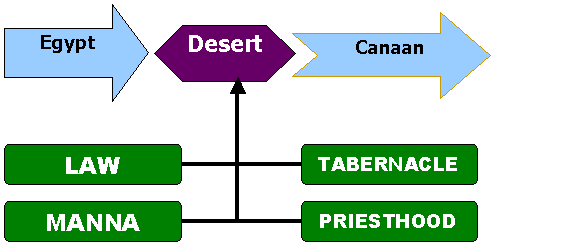
What is the identity of Israel in Egypt? Slaves. They were part of the structure of Egyptian society.
When did they learn about God and learn his ways? When did they get the Law and the covenant commands? (Ex. 19-20) (Ex. 24 covenant) When were they fed with manna? Quail? (Ex. 16) When was water provided from the rock?
When did they fight the Amalekites? (Ex 17) When did real leadership in Israel form (ex. 18) When did they build the tabernacle? When did they develop the priesthood?
These great events that shape Israels identity do not happen in Egypt or in Canaan. The happen in the desert the in-between place. The slaves of Egypt are formed into Gods nation before they enter the land.
Babylonian Exile:
Another important "in-between" event that will shape the identity of Israel is the exile. Consider the awesome loss that the people experience in 587 B.C. when they are invaded and overpowered by the Babylonians (see Lamentations and Psalm 137). This was not supposed to happen to Gods people. They lose the things they gained in the desert and after the arrival in the land priesthood, temple/tabernacle, the land itself and the king. These became meaningless under Babylonian control. But in the exile they rediscovered the law and the prophets. This is what makes them Gods people. The promise of the prophecies is that God will write his law on their hearts. He will rebuild them spiritually and materially.
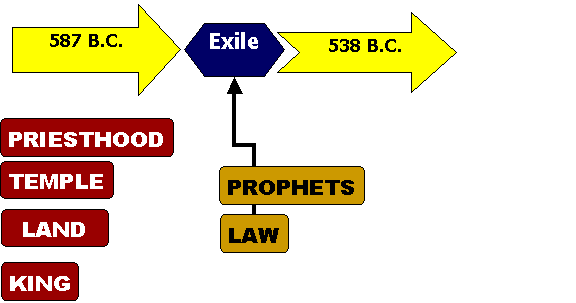
This is the setting for the Deuteronomy 4 text ...
"But if from there you seek the LORD your God, you will find him if you look for him with all your heart and with all your soul. When you are in distress and all these things have happened to you, then in later days you will return to the LORD your God and obey him."
The word of the prophets go back to the law and through it proclaim a time of punishment but also the hope of renewal The great prophetic sermons come out of this time of tension and crisis
Lamentations 3
Ezekiel 37 the dry bones
Ezekiel 36:24-28 A new heart and a right spirit.
Jeremiah 29:11 The plans I have for you. Seek me and find me!
Daniel 1 Daniel is versed in the language and culture of the land of exile (v. 4-5); Daniel becomes an expert at this (v. 20) and gains the trust of the Babylonians. 2:46; 4:37 Nebuchadnezzar honors God. Isnt this Gods mission to the nations in effect? If not, then what is it?
The Persecution of the Church (Acts 8)
Lest we think this is some bizarre Old Testament phenomenon, there is a New Testament example of this. In Acts 8, Luke tells us that the church is scattered from Jerusalem after Stephen is executed. What must the people been thinking at this point? For most of us this would be the end. How can they remain faithful if their connection to Jerusalem is severed?
What do the scattered people do? They preach Jesus! What was Jesus agenda in Acts 1:8? That they would become his witnesses in Judea and Samaria and to the ends of the earth.
God is doing something with this in-between time and Judea and Samaria become the launching points for mission to the ends of the earth. (see 11:19) The scattered disciples go to Antioch and some of them start converting Gentiles! Antioch becomes the base for Paul and Barnabas journey. Who could have predicted that the persecution could lead to such an outcome?
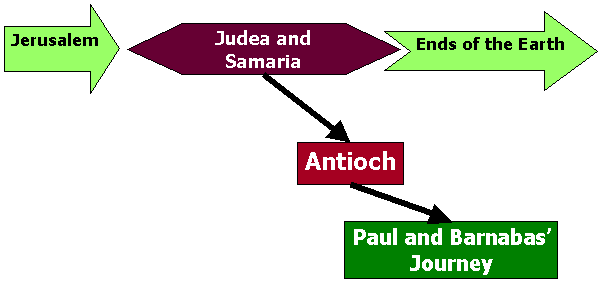
What about Us?
So is this just the way God did things long ago but now he likes them stable and same? Did God pick the 20th century as the way to keep things? How do we lament change but also open ourselves up to what God may be doing during the in-between NOW?
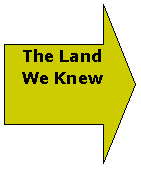


Do we have the faith to discover what God is doing with us in the in-between time? The changes that are taking place are lamentable in many cases, but God may be working in them still. They also may be stripping us and cleansing us of so many sinful attitudes and habits we have picked up. These may be things that are keeping us from renewal and hope
We have to open ourselves to what God is doing among us in the "in-between" time and trust in him to provide the future. On another level, in this world we have no lasting city but we await the city to come and so what do we do? We leave the city of this world and join Jesus outside the camp ...
Hebrews 13:12-14
Part 3 Plans for a Future
It was 1991 and I had completed my first year of graduate school. The campus minister at the Razorbacks for Christ wanted me to come back to the RFC spring banquet and share my thoughts on what the RFCs should do next. He wanted me to articulate a plan for the future. Thankfully, I felt very inadequate to the task. I struggled about what to say. Then I recalled something that Dr. John Willis had taught us in Old Testament. It was this text from Jeremiah 29.
The future is a gift from God. This is the message from the prophet for the people of God captive in Babylon. They are in despair. They have lost their land, their king, their homes and their fortunes. Will God punish them forever? Has he abandoned them?
The message is gospel - it is good news. (Jeremiah 29:11-13)
God made a promise to Abraham and he keeps this promise. God has saved these people - but not just for their own sake it is for the sake of the world.
Is it any different with us? We also are saved - but not for our own sake, but for the sake of the world!
The captives in Babylon could dream of a hopeful future - if they sought after God. What about us? Can we dream again? Sometimes I fear we have lost our dream and our vision. Or we forget the reason for our salvation and our future. We do not secure the future. God does.
Can we expect our future - especially the future of the church - to be hopeful? I think we can, but we have to look beyond the two typical options we often assume are our only options ...
Two Typical Options
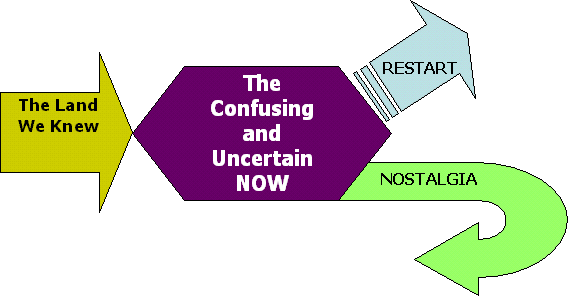
The first option is Nostalgia
Lets return to what we knew! Go back to how it was!
This is impossible
The second option is the Restart
This is Reactionary Change We will start over anew. But we are still in control. We attempt to jettison the past to get a new future. But this is really just rebellion controlled by the past or the present uncertainty. It is inattentive to history.
Even though these options seem to be different, they have some negative characteristics in common:
Is Anything Too Difficult for the Lord?
This question begins with Abraham and Sarah Genesis 18:14
Abraham and Sarah God asks the question of Sarah because she laughed. Dont be too hard on Sarah. If your 99 year old grandfather and his 90 year old wife who never had children told you they were expecting you would laugh too. The only future these folks have is buying a tombstone not buying pampers. Is anything too difficult for God?
Jacob Steals the Promise Now what? Is that the end of the story? No future? Would you entrust the future to Jacob? Esau wasnt too great either but at least he didnt resort to tricks. Is anything too difficult for God?
Slaves in Egypt/The Desert Who can stand up against Pharaoh? They are pushed against the Sea trapped! They will probably die in the desert. Why continue with these people? Surely they wont make it. Why not restart? Why not go back to Egypt? Is anything too difficult with God?
David and Goliath Who would have bet on David? And he even refuses Sauls armor. Oh, the good old days before the Philistines! Is anything too difficult for God?
Exile What if you lost everything that communicated Gods blessings? Would you still believe God was able to deliver? What if foreign agents broke into Gods house and evicted him? Whose God is most powerful? [Exile Jeremiah 32 Buying the field with the imagination of a new future. Gods vision.]
Is anything too difficult for God?
Cross What if your deliverer and Messiah were executed? How do you restart? How do you return to what was? Is there any hope for the future? Is anything too difficult for God?
Emerging future
Between the two typical options there is a third. It is the option of the emerging future that is a gift from God. To find it we must be willing to do the following: Dwell in this place without quick solutions and we will hear God's solutions and hope for a possible future
Most models (Nostalgia and Restart) for change and response to changing circumstances begin with a conclusion and then suggest a strategy to get there. In reality, there is no quick-fix! This is hard work. Rather than quick-fix, instant-bake plans, we need to empower and release the people to use God's resources. If we are attentive to God perhaps we can determine what he wants for our future. How can he redeem our experience? (Joseph, Genesis 50 You intended this for evil, but God intended it for good).
Waiting on God to give us the future that is from him is always best. Do you recall how Abraham and Sarah tried to manage Gods promise of the future? The result was Ishmael. Abraham loved Ishmael and God blessed Ishmael, but Ishmael was not the future God intended and conflict came out of Ishmaels birth. Dont forget that Ishmael was Abrahams first born son but God has a way of determining the future on his terms, not ours.
Leaving the land that is known is always an occasion for God to shape his people into a people especially prepared for his mission in the world.
 Link to next sermon
Link to next sermon
 Link to other sermons of Chris Benjamin
Link to other sermons of Chris Benjamin